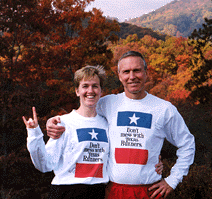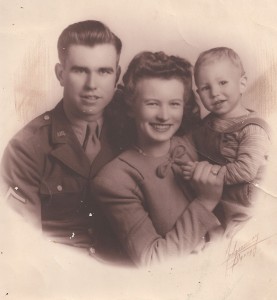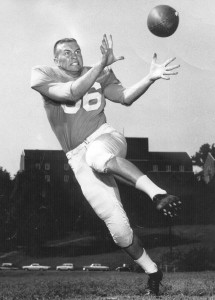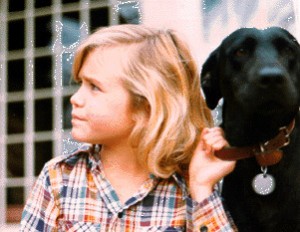My story and I’m sticking with it
“Be careful, Brucie, you might get hurt.” A frequent refrain from my great-grandmother and great-aunt while I was growing up in the late ’40s. Well meaning though they may have been, each hovered over me like a domineering mother hen. And my mom, Sue, filled with the intense desire to protect me from polio, tended to isolate me from others who might be carriers of the disease. “Better come in and rest now, Brucie. You don’t want to get too tired.” My dad, Mack, bless his heart, was so busy working on his electrical engineering degree at Southern Methodist University on the G.I. Bill and earning extra money on the night shift at the local Dr Pepper plant that I only saw him on weekends.
It’s no wonder then that I lived my early life as a shy, sensitive, scrawny boy with little self confidence in my own abilities and considerable difficulty relating to children my age, especially those of the opposite sex. I learned to dance to the tune of the women in my life in order to get their approval, in order to be taken care of, in order (in my little mind) to survive. But then I resented them for their smothering “love”, for telling me what to do and how to do it and for thwarting my embryonic desire for independence.
My life as a jock
To keep from being relegated to the dreaded “sissy” status in the grade school pecking order, I began playing sports with great intensity. For fun, of course, but also to win and, thus, prove that I was a boy to be reckoned with. I took up football and basketball in junior high with a vengeance. To gain an edge I lifted weights regularly and ran in the off-season, activities that were almost unheard of in those days. And my actions paid off. I became a starter my junior year on a highly-ranked high school football team, composed primarily of seniors. And in my senior year I was elected captain of the team, played in a high school all-star game in Ft. Lauderdale, Florida, and was awarded an athletic scholarship to the University of Tennessee at Knoxville. On the surface, I was the epitome of the All-American boy—bright, attractive, athletic, cool, with all the accoutrements including a fast car. I didn’t have to go after girls; they came after me. But underneath I was still a frightened, self-conscious boy, and any crack in the facade I’d built to protect myself was devastating. I was ever alert for any disrespect (real or imagined), and when it came from male detractors, I frequently dealt with it with my fists.
Unbeknownst to myself, I had inadvertently taken on the macho, stoic mask typical of many Southern males of the time. And at the University of Tennessee, I perfected the drama—cynical, aloof, hard-drinking, foul-mouthed, brawling, misogynistic, womanizing football player. Never mind that I had to drink a six-pack of beer to get up the courage to ask a co-ed out for a date or even to feel somewhat comfortable in my skin at fraternity parties. To the untrained observer, I was master of my domain.
I found out almost immediately upon arrival at UT in 1961 that big-time college football was not what I’d envisioned. More like a grueling, year-round job than an enjoyable, seasonal pursuit. I left the team and tried life as a regular student for a while. But the persona I’d constructed was built around being a football player, so I transferred to a small private school, the University of the South at Sewanee, Tennessee. Football there was much closer to what I was looking for—more camaraderie with my teammates and a short eight-game schedule with no off-season workouts.
Facing the real world—married with child
Upon graduation from Sewanee and the end of my football career, I slowly realized that machismo didn’t play as well in the real world. I continued to self-medicate with beer and strong drink to quiet the voices in my head that accused me of being helpless, worthless and beneath contempt. I also began supplementing the alcohol with the drugs of the ’60s and ’70s—pot, opium, LSD, peyote, psilocybin, etc. “There’s got to be more to life than this,” I often thought. “If I could just find the way.”
In 1967, then in my mid-20s, I married a lovely, loving woman, Shannon, more out of obligation than commitment since she was pregnant with our daughter, Lilla. My wife and I frequently struggled to make our relationship work, both still in prolonged adolescence, me continuing my tough-guy charade. But in many ways I remained a scared little boy wanting to be cared for, searching for my place in the world. As the years passed I tried different paths—political activism, yoga, meditation, more psychedelics and, finally, running away to Louisiana with another woman—all to no avail.
Bottoming out and waking up
There I was in Baton Rouge in 1986, no job, few friends, estranged from my daughter after the divorce from her mom, my new marriage to Deb beginning to fray a bit at the edges. I had, in 12-step lingo, bottomed out. In desperation I called my friend, John, who recommended a powerful self-awareness workshop sponsored by the Kairos Foundation. [kairosfoundation.org] While I had limited myself to a narrow range of feelings that were OK (in my mind) for men to express (anger foremost among them), I found myself in an atmosphere at the workshop in which it was safe to express a more complete range, including love, hurt, fear, forgiveness and compassion. I’d found the magic doorway that I’d been looking for, the realization that life was full of possibilities and a way of being for myself that more closely fit who I really was, not who I thought I had to be.
So I shed the macho persona that had kept me from real connection with my fellow humans (especially women) through the years. And I quit drinking and taking drugs. But though I knew that the tough-guy routine was finished, I wasn’t quite sure what to replace it with. So I assumed the role of sensitive new-age-guy—what I thought women wanted. Always be loving, kind and generous. Never get angry, frustrated or upset. Always put the seat down after using the toilet. Always defer to others, especially members of the opposite sex. I’ll have to tell you that this charade was just about as arduous as the macho man.
Fortunately (though I didn’t think so at the time) a self-exposing incident came along to help wake me up to my true identity. Our friend, Jenny, was helping Deb and me work through some of our relationship issues. One of these was my underemployment at a small ad agency. Deb, the primary breadwinner at the time, asked how my search for a better job was going because, hearing the biological clock ticking, she’d hoped to take some time off from work to have a child. I hemmed, I hawed, I made lots of excuses for my lack of progress, but Jenny cut to the chase: “When are you going to grow up, Bruce?” I was frozen in my tracks. “I haven’t looked for another job,” I finally admitted. “I haven’t kept my word.” It was in that terrifying moment that I realized the time had finally come to take responsibility for my life rather than acting like a victim, at the complete mercy of outside events and outmoded beliefs about myself. My relationship with Deb was just about complete; my relationship with myself was just beginning.
Taking responsibility for my life
One day shortly thereafter I realized that my daughter was about to graduate from college, my divorce from Deb was final and my year-long consulting contract with a Ft. Worth company was nearly finished. I made my first conscious choice about where I wanted to live. I decided to move to Austin, Texas, where I became the local program coordinator for the Kairos Foundation, helped form a powerful men’s group and earned my living as a freelance writer. I lived in a small cottage in the hills outside of town, alone except for my trusty cat, Chocolate. Without a primary relationship for the first extended period of time in my life, I came to understand that I had spent so much time focused on the other and giving her what I thought would make her happy, that I had neglected myself. Bottom line: I learned to love myself, to stand up for myself, to discern the truth from the idle chatter of my mind, to embrace radical honesty and to keep my word.
After about five years of this solitary life, I realized that I was ready for a life partner (rather than a caretaker). I began a conscious process of determining the attributes I wanted in a mate. It was a pretty long list, and around ten items on the list were absolutely non-negotiable, including authenticity, integrity, compassion, physical attractiveness, athleticism, and commitment to personal and spiritual growth.
The woman of my dreams
Though it really wasn’t love at first sight (we ran together in a marathon training group during most of 1996 before we ever went on a date), and I had some beliefs to deal with about our age difference (I was 53, she was 24), it soon became evident that we had found one another at just the right moment and that Shonnie was the woman I had been envisioning.
There were, of course, certain adjustments to be made. Shonnie subsisted primarily on cereal and salad while I preferred a more well-rounded vegetarian diet. And it took a while for Chocolate to settle in with Shonnie’s three cats. But we ran at approximately the same pace, we both intended to live authentic lives and we loved one another deeply. I’d made a conscious choice about my lover/confidante/friend/training partner, and I did it without all of the add-ons and expectations of the past. I was no longer looking for a woman to take care of me. I was seeking (and had found) a partner, a co-equal who would (and does) stand beside me, shoulder-to-shoulder, heart-to-heart as we confront life’s challenges and create fulfilling lives.
On May 30, 1999, Shonnie and I confirmed our commitment to one another at our marriage at Bend of Ivy Lodge outside Asheville. And in the years that have followed, we’ve kept our wedding vows and the purpose for our relationship alive by holding biweekly meetings. If we discover we’re off track in some area, we determine how we will again create congruence between our words and our actions. During this time we  also acknowledge one another for accomplishments and ways of being that we deem significant. Finally, we tell each other the truths that have been withheld so that no secrets separate us. Being human we still hit bumps in the road from time to time, but the breaches in our connection these days are few and of short duration.
also acknowledge one another for accomplishments and ways of being that we deem significant. Finally, we tell each other the truths that have been withheld so that no secrets separate us. Being human we still hit bumps in the road from time to time, but the breaches in our connection these days are few and of short duration.
Today, I’m still something of a jock, playing handball a couple of times a week at the YMCA. In addition, Shonnie and I continue to run together. Since moving to Asheville in 1997, we’ve participated in the grueling 18-mile Shut-In Trail Race twice. And just about every Saturday you’ll find us out on a mountain trail somewhere in Western North Carolina, Shonnie faster on the uphill grades, me faster on the downhill, arriving at our destination together . . . in speed and in spirit.
This piece was originally published in the June 2005 edition of WNC Woman.





Thanks for your story, Bruce. It gives us hope that we can always make things better–for ourselves and others.
Bruce, you are indeed the macho guy you set out to become when you were a child! It takes genuine courage to be this open about yourself, and I applaud you. Thanks!
Thanks Bruce for sharing you very interesting story of your life challenges.
Love reading this Bruce. Didn’t know your dad attended SMU. Growing up is fun even if it takes awhile. You did good!
Interesting how some things read when you don’t proof. Dread not Bruce – I loved reading it.